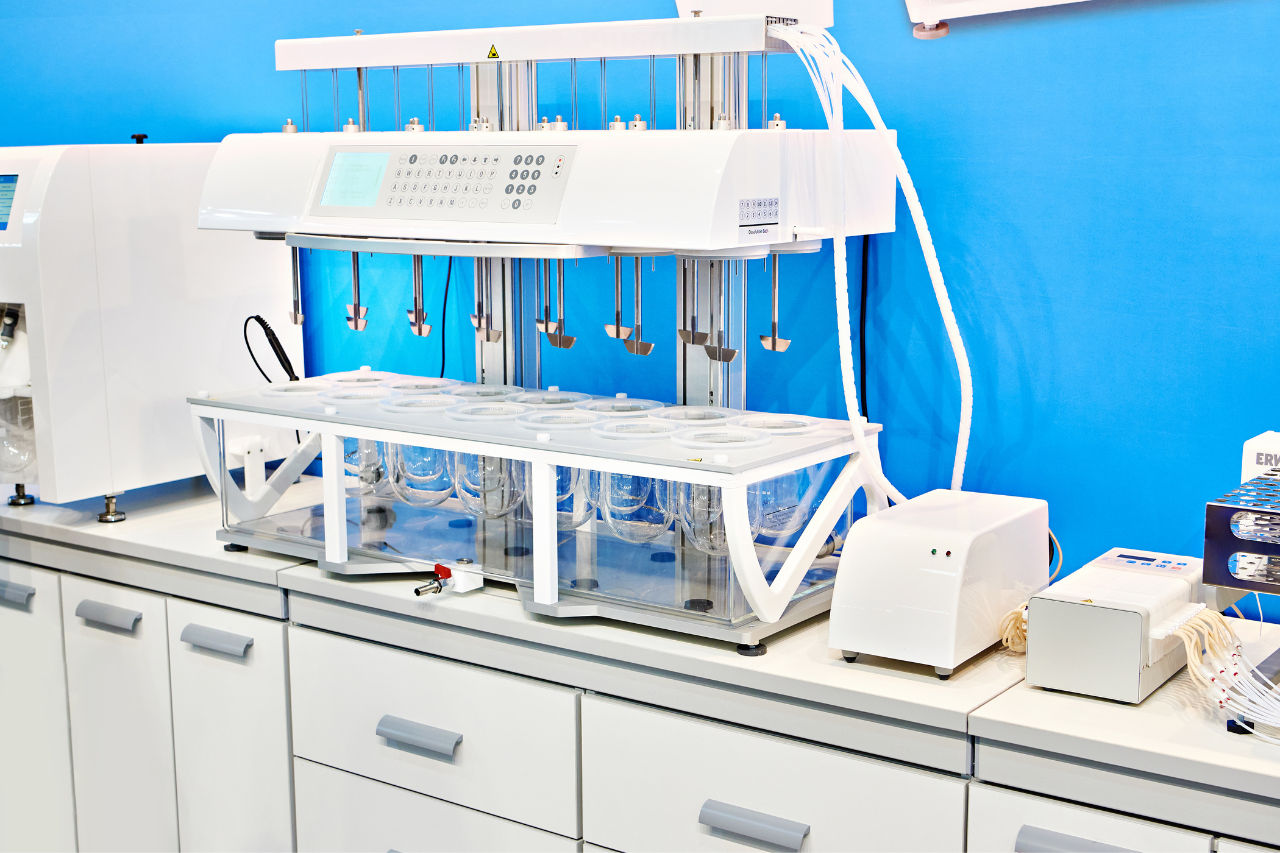Introduction:
In the realm of pharmaceutical development, ensuring the efficacy and safety of drug products is paramount. Tablet dissolution testing is a crucial step in this process, offering insights into drug release kinetics and bioavailability. This article delves into the importance of tablet dissolution testing, elucidating its significance in pharmaceutical research and development.
Understanding Tablet Dissolution Testing:
Tablet dissolution testing involves assessing the rate and extent of drug release from a solid dosage form, typically tablets or capsules, in simulated physiological conditions. It mimics the dissolution process upon ingestion, providing valuable data on drug formulation performance. The test is conducted using dissolution apparatuses such as paddle, basket, or flow-through systems, with parameters tailored to mimic gastrointestinal conditions.
Importance of Tablet Dissolution Testing:
Quality Control: Tablet dissolution testing is a crucial quality control measure, ensuring batch-to-batch consistency in drug release. Variations in dissolution profiles can signal formulation or manufacturing discrepancies, prompting corrective actions to maintain product efficacy and safety.
Formulation Optimization: Dissolution testing aids in optimizing drug formulations by evaluating the impact of excipients, manufacturing processes, and formulation parameters on dissolution kinetics. It enables formulation scientists to fine-tune compositions for optimal drug release profiles, enhancing bioavailability and therapeutic outcomes.
Bioequivalence Assessment: Demonstrating bioequivalence to the reference product is essential for generic drug development. Tablet dissolution testing plays a pivotal role in comparative studies, enabling the assessment of in vitro dissolution profiles to establish bioequivalence with the innovator drug.
Predictive Modeling: Dissolution data serve as inputs for predictive modeling of in vivo drug behavior. By correlating in vitro dissolution profiles with pharmacokinetic parameters, such as absorption rates and plasma concentration-time curves, researchers can predict drug performance in vivo and optimize dosing regimens.
Regulatory Compliance: Regulatory agencies mandate tablet dissolution testing as part of drug approval processes to ensure product quality, safety, and efficacy. Compliance with dissolution specifications outlined in pharmacopeial standards ensures regulatory approval and market acceptance of pharmaceutical products.
Challenges and Advances:
Tablet dissolution testing has been a cornerstone of pharmaceutical development for decades, but as the industry evolves, so must the methodologies and technologies used in this critical process. This article explores the future of tablet dissolution testing in pharmaceutical development, considering emerging trends, advancements, and challenges.
Advanced Analytical Techniques
The future of tablet dissolution testing lies in integrating advanced analytical techniques. Technologies such as spectroscopy, chromatography, and imaging methods offer enhanced sensitivity, allowing for real-time monitoring of dissolution processes and providing deeper insights into drug release mechanisms. Researchers can obtain comprehensive data for better formulation optimization and characterization by combining these techniques with traditional dissolution testing.
Innovative Dissolution Models
Moving beyond conventional dissolution models, the future will see the development of innovative dissolution models that better mimic physiological conditions. Physiologically-based dissolution models (PBDMs) aim to simulate gastrointestinal dynamics more accurately, considering factors such as pH variations, fluid dynamics, and transit times. These models enable a more physiologically relevant assessment of drug release, leading to improved in vitro-in vivo correlations (IVIVC) and better prediction of drug behavior in vivo.
Integration of Artificial Intelligence (AI)
Artificial intelligence (AI) and machine learning (ML) are poised to revolutionize tablet dissolution testing. By analyzing vast datasets, AI algorithms can identify complex dissolution patterns, optimize experimental designs, and predict dissolution outcomes more accurately. AI-powered dissolution testing systems can adaptively adjust testing parameters in real time, leading to faster and more efficient formulation development and optimization.
Miniaturization and Automation
Miniaturization and automation will continue to reshape tablet dissolution testing in the future. Microfluidic-based dissolution platforms allow testing with reduced sample volumes and faster analysis times while providing greater control over experimental conditions. Automated dissolution systems equipped with robotics and high-throughput capabilities enable simultaneous testing of multiple samples, enhancing efficiency and throughput in pharmaceutical development laboratories.
Regulatory Considerations and Harmonization
As tablet dissolution testing methodologies evolve, regulatory bodies must adapt their guidelines and standards accordingly. In the future, efforts will likely be made towards harmonization of dissolution testing requirements globally, ensuring consistency and compatibility across different regions. Regulatory acceptance of novel dissolution models and advanced analytical techniques will foster innovation and drive continuous improvement in pharmaceutical development practices.
Conclusion:
Tablet dissolution testing is central to pharmaceutical development, offering invaluable insights into drug release dynamics and product performance. From quality control to formulation optimization and regulatory compliance, its importance permeates every stage of drug development. With continual advancements driving innovation in dissolution testing methodologies, its relevance in pharmaceutical research and development is poised to grow, facilitating the delivery of safe, effective, and high-quality drug products to patients worldwide.


